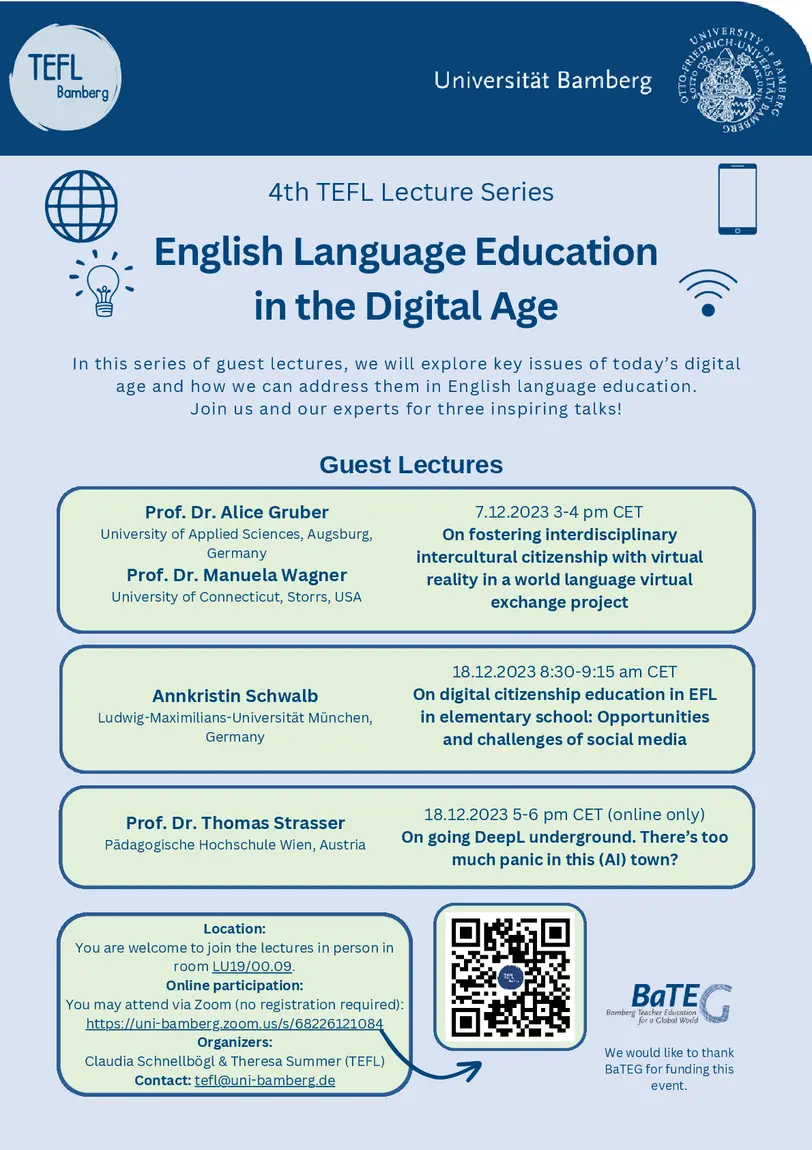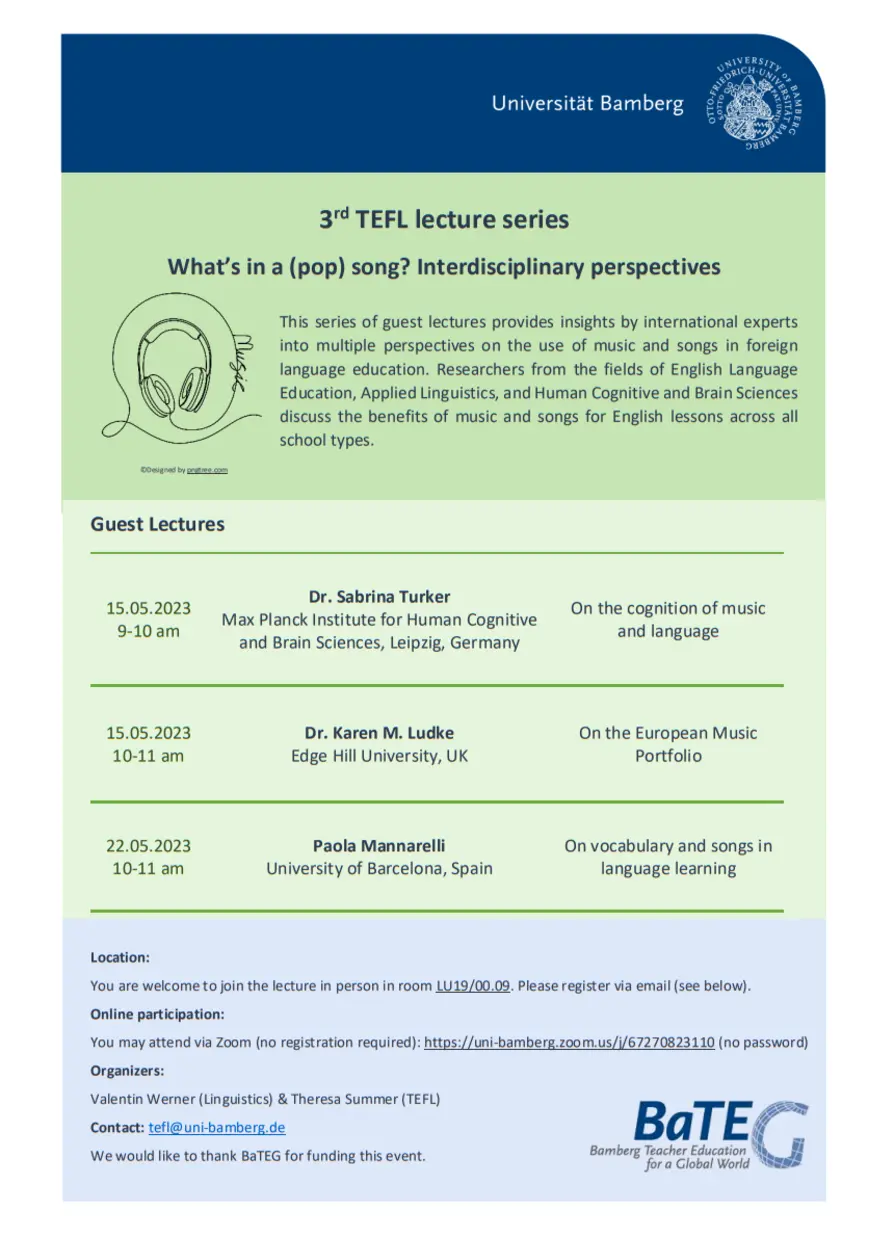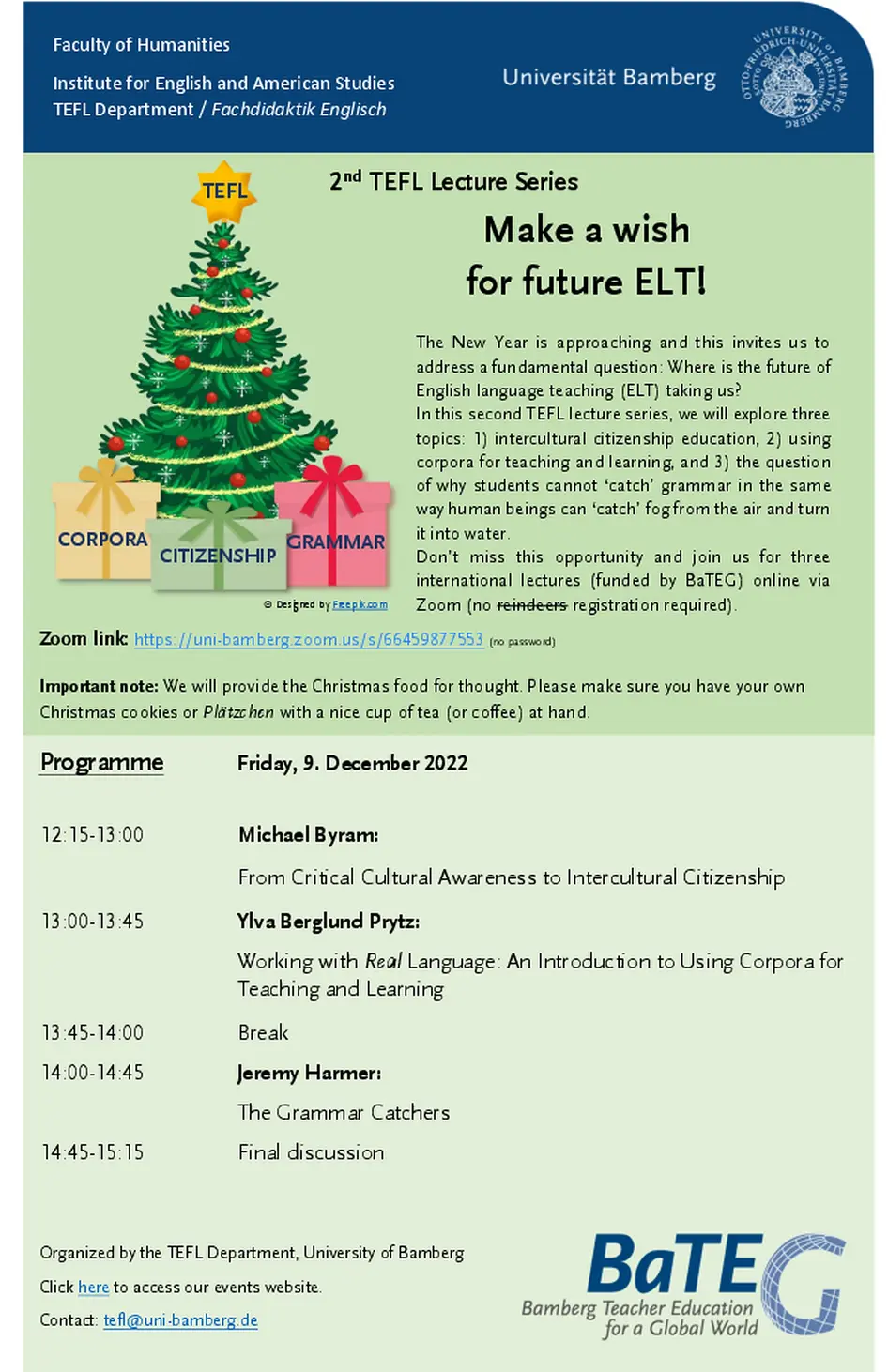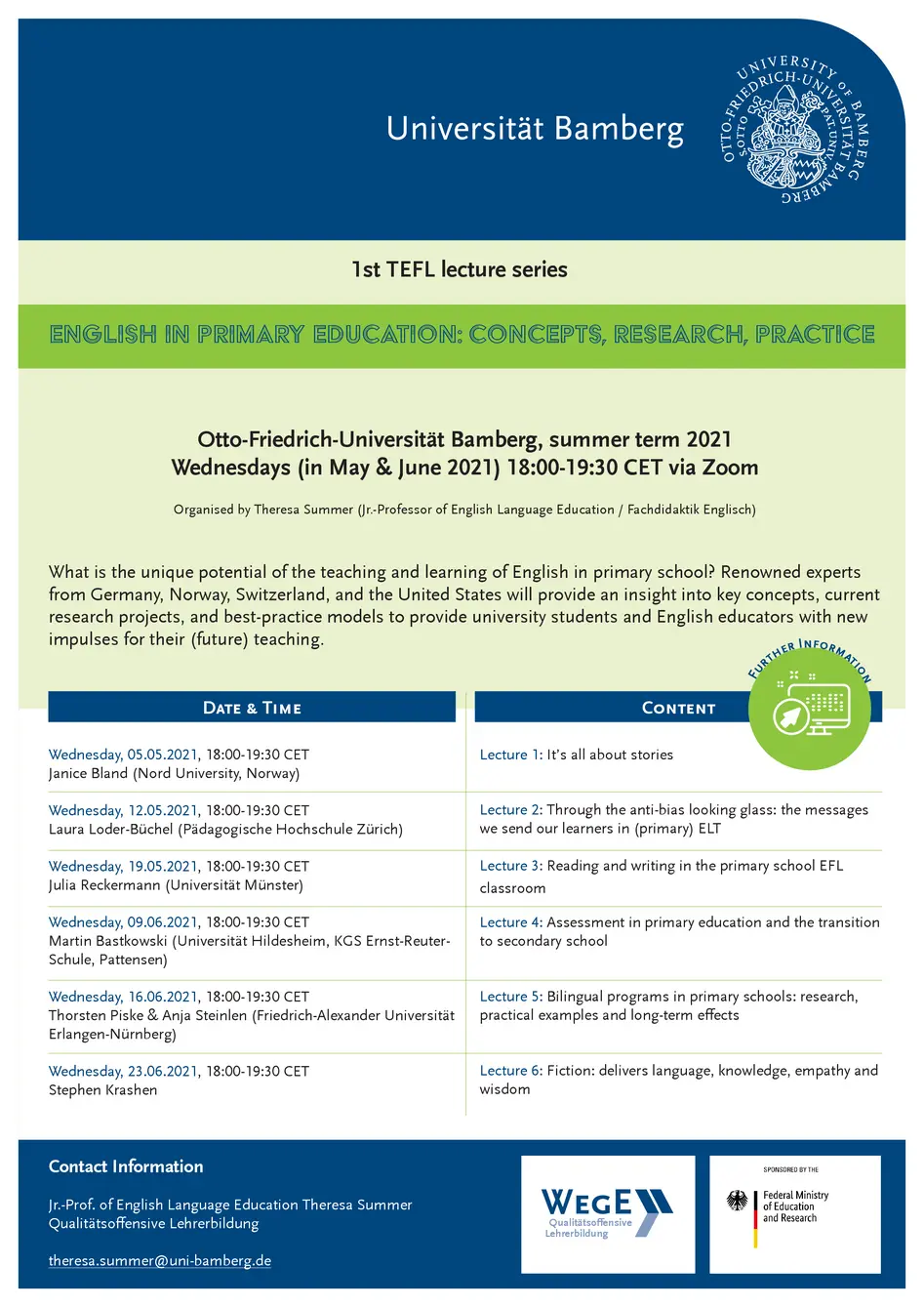TEFL lecture series
We regularly organize TEFL lectures to discuss current issues of English language education with our students, practising teachers, and researchers. Below you can find an overview of past lectures.
4th TEFL lecture series: English Language Education in the Digital Age (December 2023)
Abstracts
7.12.2023, 3-4 pm CET https://uni-bamberg.zoom.us/s/68226121084
Intercultural citizenship (ICit), i.e., students’ ability to solve complex interconnected issues throiugh intercultural dialogue, has become indispensable in today's interconnected world. This study investigates the following questions: What can Virtual Reality add to developing the necessary knowledge, skills, and attitudes? How do language learners perceive the opportunities and challenges of VR as a pedagogical approach when collaboratively solving real-world problems? Our exploratory study combined Virtual reality (VR) and Virtual Exchange (VE) with the framework of Intercultural Citizenship (ICit) and the United Nations’ Sustainable Development Goals (UN SDGs) to investigate affordances of VR and VE in relation to the students’ development of ICit. Nineteen learners of German, consisting of university students of German in the US (United States) and students studying at a German university, met in dyads or triads in VR over six weeks and worked on their independent projects. Analyses of the data (pre-project and post-project surveys, weekly journal entries, project presentations, essays) revealed that participants applied their linguistic skills, developed their intercultural competence, and enhanced their critical language awareness related to the issues they studied. The findings also give insights into the role VR played in building relationships, communicating, and developing intercultural competence in an authentic setting.
18.12.23, 8:30-9:15 am CET https://uni-bamberg.zoom.us/s/68226121084
Europe-wide educational institutions emphasize the importance of digital citizenship education for young children. In 2016, the KMK already called for digital literacy to be the common task of all school subjects from the first grade onward (cf. KMK 2016). But is that even necessary anymore? Aren’t we all teaching digital natives who don’t need to be educated on DCE any longer? Studies clearly indicate otherwise. Factors such as socio-economic status, education, place of residence, gender, language - to name just a few - dramatically influence participation and reinforce the digital divide (Dudeney, Hockly, Pegrum 2014: 10). Access to the internet has improved in recent years through mobile technologies. However, the digital divide is still present: "the term […] has been repurposed to refer to the gap between those with the skills to make effective use of digital technologies, and those who lack such skills.” (ibid: 15) Henry Jenkins speaks of a participation gap (cf. Jenkins 2006: 12). The students on the wrong side of this gap have fewer opportunities in society. The tension that arises between curricular demands and the pressing matter of the participation gap was the starting point for this action research project, which uses social media as an age-appropriate tool to start a conversation about DCE with children.
18.12.2023, 5-6 pm CET https://uni-bamberg.zoom.us/s/68226121084
What are the methodological and ethical implications of Artificial Intelligence in language learning and teaching? Thomas Strasser will provide an overview of the methodological and ethical implications of Artificial Intelligence in language learning and teaching. The presentation will discuss how AI-based systems, including narrow AI applications like ChatGPT, DeepL, and Midjourney, can be effectively integrated into specific language teaching and learning scenarios. Additionally, the latest research in the field of AI and language learning processes will be explored.
This overview aims to address several critical questions:
- What are the possibilities and limitations of AI in language teaching?
- What is the role of the language teacher within the context of AI?
- How will grading and assessment evolve due to AI integration?
- How can tasks be enhanced through intelligent error analysis, intelligent feedback, and scaffolding techniques?
- In what ways can AI support and augment language teacher feedback?
First TEFL lecture series: English in primary education (May and June 2021)
Motivating stories and stirring images, high quality language input, essential phonological and semantic repetition, genuine communication when talking around texts, empathy training, perspective-taking and opportunities for creativity, these are just some of the reasons for sharing stories in the primary school. The picturebook has over the last several decades developed into a highly sophisticated multimodal format, essentially defined by the interaction between the words and pictures as vital to the meaning-making process. During and between the readings of a picturebook, both language development and cognitive development of the young learners can take place, and visual literacy of the teacher as well as the children. This presentation will look at the many language-related educational goals possible when we include children’s literature in language education, and the roles of the teacher in sharing a picturebook. I will give examples using Anthony Browne’s classic picturebook Zoo.
Janice Bland is Professor of English Education at Nord University, Norway. Her main interests are children’s and young adult literature in English language education, multiple literacies, in-depth learning, creative writing and drama methodology. Janice is editor-in-chief of the open access journal, Children’s Literature in English Language Education.
Date: 05/05/2021 from 18:00-19:30 CET [30 min presentation + discussion + interview]
Zoom: uni-bamberg.zoom.us/j/97007777365
Passcode: Primary1!
Meeting ID: 970 0777 7365
English language teaching materials in Swiss primary schools are fraught with images and examples that upon closer scrutiny, need unpacking or even replacement to steer learners away from stereotypes and to promote deeper thought and encourage exposure to the world. The purpose of this lecture is multifold. Firstly, you will be introduced to the Learning for Justice’s Social Justice Standards and shown how these can be applied to standard coursebook images for basic A1, A2 and B1 level activities and see that these same activities can be applied to images and texts from other sources, such as international newspapers’ images of the day. Secondly, results of a classroom experiment with pre-service teachers using the Dispositions for Culturally Responsive Pedagogy Scale will be shared and ideas for prompting discussion provided. Finally, larger projects that could be done in EFL lessons in public primary schools to promote an anti-bias stance to education will be suggested.
Laura Loder-Büchel is a teacher trainer at Zurich University of Teacher Education. You can read more about her here: https://phzh.ch/personen/laura.loder
Date: 12/05/2021 from 18:00-19:30 CET [30 min presentation + discussion + interview]
Zoom: uni-bamberg.zoom.us/j/97007777365
Passcode: Primary1!
Meeting ID: 970 0777 7365
When teaching English as a foreign language to young learners, the focus is usually on oral skills: speaking and listening. Reading and writing are ascribed a supportive function, yet they are partly being neglected overall. This presentation will provide details about the status of written competences in the primary EFL classroom and critically discuss pro and con arguments in the debate on early biliteracy. It will outline research results as well as practical suggestions as to how teachers can (and should) include reading and writing activities with young language learners. I will also make a case for challenging reading and writing activities that are interesting and relevant for young learners, also touching in supportive measures and differentiation in heterogeneous learner groups. Without contesting the primacy of oral skills, the question is no longer if reading and writing should be included in early foreign language learning, but how.
Julia Reckermann holds a junior professorship for teaching English as a foreign language at the University of Muenster. One of her foci is teaching young language learners. She is a fully trained primary school English teacher and has conducted her PhD on reading picture books in the primary school EFL classroom.
Date: 19/05/2021 from 18:00-19:30 CET [30 min presentation + discussion + interview]
Zoom: uni-bamberg.zoom.us/j/97007777365
Passcode: Primary1!
Meeting ID: 970 0777 7365
Managing a smooth transition (and not gap!) between primary and secondary schools has been quite a challenge. On top of that, questionable prejudices and assumptions like “they only sing and play at primary schools” or “they only focus on grammar and vocab tests at secondary schools” contribute to a rough path to successfully generate a “bridge” between primary and secondary level of education.
In this lecture, we will be dealing with a specific element of this challenge: assessment.
1. We will look at natural biases (e.g. effects like Halo, leniency, primacy, …) that influence our assessment of learners.
2. Together, we will collect and discuss different examples of assessment tasks in the areas of speaking, writing, listening and reading – for both primary and secondary level.
3. Finally, we will talk about how to manage the transition between primary and secondary schools.
Martin Bastkowski has taught at primary and secondary schools in Germany, Ireland and the US. Currently, he is head of the foreign languages department and member of the school management at a comprehensive school in Lower Saxony, visiting lecturer for English language education at the English Department at Hildesheim University, author and advisor for teaching materials and teacher-trainer.
Date: 09/06/2021 from 18:00-19:30 CET [30 min presentation + discussion + interview]
Zoom: uni-bamberg.zoom.us/j/97007777365
Passcode: Primary1!
Meeting ID: 970 0777 7365
Many studies have shown that most students attending bilingual programmes develop much higher levels of foreign language proficiency than students in “traditional” foreign language lessons. In Bavaria, bilingual programmes already have a longer tradition at secondary schools. However, since 2015 bilingual programmes have also been initiated at several Bavarian primary schools. In our presentation, we will illustrate similarities and differences between the teaching strategies used in regular English lessons and in bilingual programmes. Then we will summarize the results of studies examining questions teachers, parents and school administrators are often concerned about, for example: Do students in bilingual programmes show deficits in the development of their native language or in the development of subject knowledge? Are bilingual programmes also suitable for children from migrant backgrounds and for children who are at risk of poor academic achivement? Finally, we will discuss how children who attended a bilingual programme in primary school should be supported in secondary school.
Thorsten Piske is Professor and Chair of Foreign Language Education at the Friedrich-Alexander-University of Erlangen-Nürnberg, Germany. His research focuses on first and second language acquisition and on bilingual education. His recent publications reflect his strong interest in the implications of first and second language research for language classrooms.
Steinlen, Anja is Senior Lecturer at the Department of Foreign Language Education at the Friedrich-Alexander University Erlangen-Nuremberg, Germany. In 2002, she completed her PhD on L2 speech learning at the University of Aarhus, Denmark. Her work currently focuses on first, second and third language acquisition in bilingual and regular institutions, especially with regard to children with a migration background and learning disabilities. The results of her PhD and post-doc projects have been published in two books (2005, 2021).
Date: 16/06/2021 from 18:00-19:30 CET [30 min presentation + discussion + interview]
Zoom: uni-bamberg.zoom.us/j/97007777365
Passcode: Primary1!
Meeting ID: 970 0777 7365
Possibly the most powerful and most underused tool we have for increasing language ability and knowledge is self-selected fiction. It works for first language, second language, and heritage language development, is pleasant, and low-cost. Self-selected reading also includes, of course, “light” reading, such as comic books and graphic novels. To take advantage of self-selected reading, however, students must have access to reading material.
Stephen Krashen has published over 500 articles and a dozen scholarly books in the fields of literacy, language acquisition, neurolinguistics, and bilingual education. He is the most frequently cited scholar in language education.
Date: 23/06/2021 from 18:00-19:30 CET [30 min presentation + discussion + interview]
Zoom: uni-bamberg.zoom.us/j/97007777365
Passcode: Primary1!
Meeting ID: 970 0777 7365



